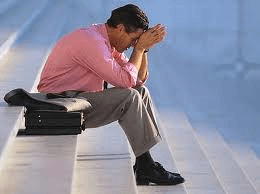Feeling Ashamed of Being Unemployed
Feeling Ashamed of Being Unemployed
Am I afraid of telling people that I am out of work?
Published by Robert L. Leahy, Ph.D. in Anxiety Files
I told a neighbor of mine that I had written a book on coping with unemployment and he said to me, “I never told you this, but last year I was unemployed for five months. The worst time for me was when I got up in the morning. I was too embarrassed to go out. I felt like I was in a prison until five in the afternoon when I could leave my apartment. I didn’t want anyone to know that I was unemployed”. How sad—but how human. He is not alone. In Tokyo businessmen get dressed up in the early morning in their suits and leave their apartments and take a train to another part of the city where they sit in a park all day until they can return home. They don’t want anyone to know that they are unemployed. For many, there is a sense of shame, of personal failure, a sense that everyone can see that they don’t have a job and that everyone is judging them. Some people think, “It’s like I am wearing a sign around my neck -unemployed, failure, unwanted.”
Normalize unemployment
But isn’t unemployment a normal condition in our economy? If there are millions of people unemployed at any one time, isn’t it part of our economic system? An unfortunate part-but also simply a reality. Being unemployed is not the same thing as committing a felony. It’s a difficult time, it’s hard to cope, but it’s seldom something anyone intentionally wants. In fact, at any time in history, the job market is fluid. People are always in and out of and in between jobs. One of my former employees filed for unemployment after he finished his training—because his next job (an internship) didn’t start for two months. He was simply exercising his rights in collecting his benefits. He was smart.
Unfortunately, we don’t live in a world of permanent, life-long jobs. We live in a fluid world, jobs change, markets change, and the job pool is “elastic”. Jobs disappear and jobs are created.
Networks count
Ask yourself, if you are unemployed, “Am I afraid of telling people that I am out of work?” If you are, then you might be missing the chance to get a job. Why? In a study by Franzen and Hangartner in 2006 in the United States, 44% of people got their job through a social contact. The more social contacts that you have, the easier it is to get a job. But if you are so embarrassed about being unemployed- and you tell no one- then you are not making use of your network. Reaching out may be the lifeline that you need.
And think about what you may be avoiding if you are like my neighbor. You are not getting out meeting people, doing things, feeling normal. You are imprisoning yourself. I suggest to my patients who feel this way that they need to take back their lives, go to all the places that they have been avoiding and even—if it seems appropriate—tell someone that they are out of work.
Don’t assume that everyone is a critic
How do you feel about a friend or family member who is out of work? Do you treat them like they are an outcast? You probably have more sympathy and acceptance for a stranger than you might have for yourself. One of my patients who had been unemployed found that a friend also told him that he had gone through a period of being out of work. Sometimes people might actually look at this as an opportunity to help someone they care about.
Take back your life
Locking yourself in your own prison and feeling ashamed about a normal but difficult part of life only undermines your opportunity to take back your life, recognize that being unemployed is simply a current situation to deal with—not a character failing—and that talking to people can help you realize that some people might actually be on your side.
Here are some things to keep in mind:
- Unemployment is a normal part of life for millions of decent people.
- Being unemployed is not a crime or a moral failing.
- Feeling ashamed of economic conditions is like blaming yourself for the economy. You didn’t cause it, you don’t control it. Bad things happen to good people during difficult times.
- Taking back your life means getting out, talking to people, and normalizing what you do.
- Don’t assume that people will judge you. Maybe they have been through this in the past.
- The more people you talk to, the better your chance of getting a job.
___________________________________________________________________________________________________________________
For further information and for more ideas regarding this issue and about career insights go to : http://www.mariellastockmal.com





